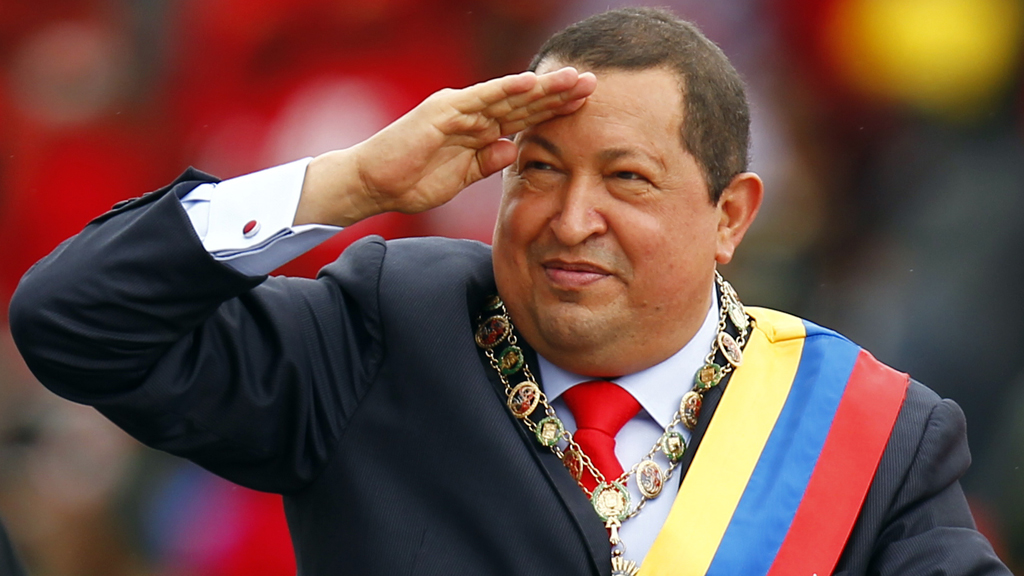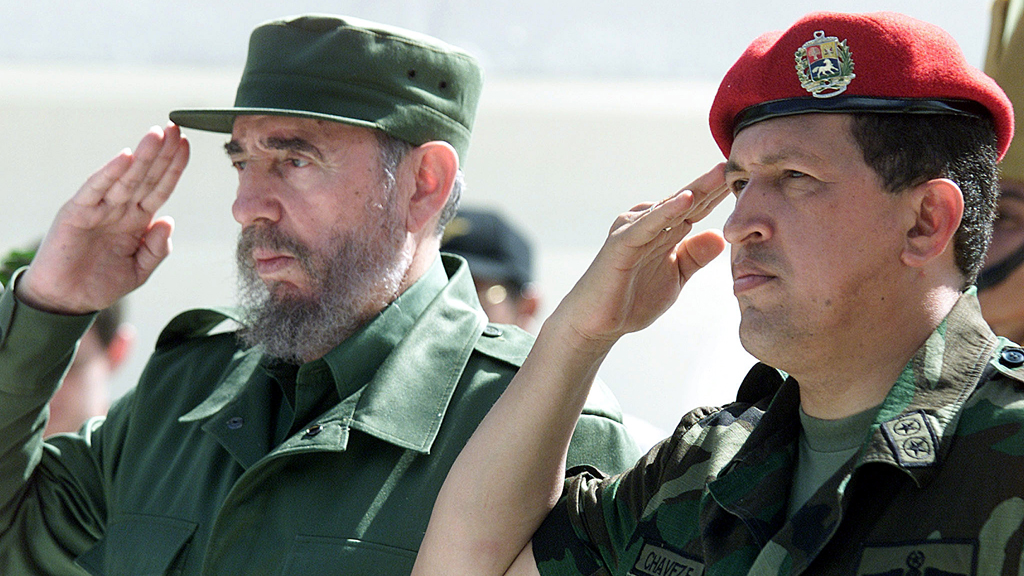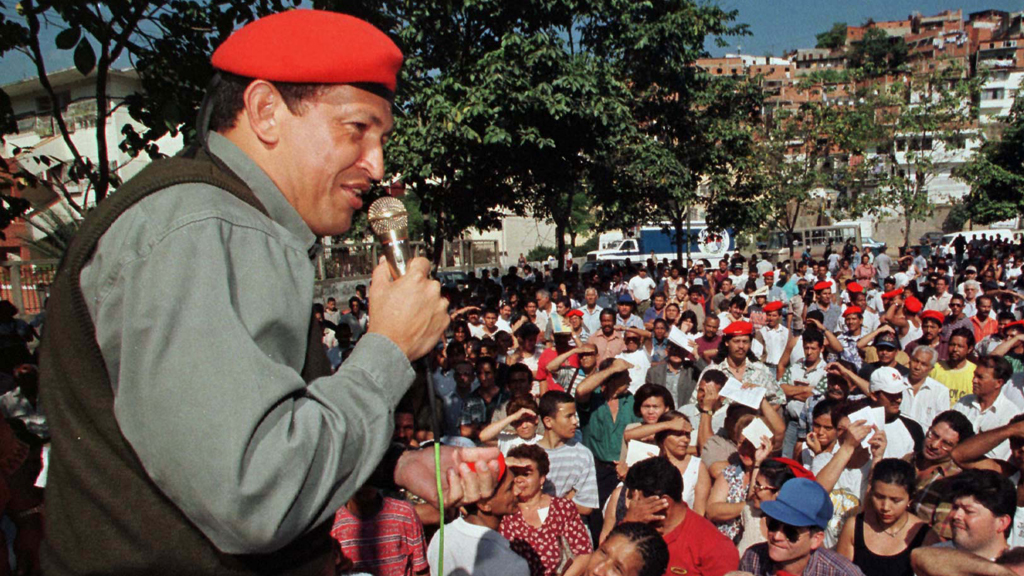Venezuela’s President Hugo Chavez dies
Venezuelan president Hugo Chavez has died aged 58 after battling cancer for almost two years.
Vice President Nicolas Maduro confirmed that Hugo Chavez had died in a televised address, flanked by senior ministers.
“It’s a moment of deep pain,” Maduro said, his voice choking.
News of the flamboyant socialist leader’s death will almost certainly be met with an outpouring of grief from the Venezuelan public who, for the last 14 years, have been governed under his cult of personality.
The question for Venezuela now is whether Chavez’s “socialist revolution” can live on without their dominant leader at the helm. Elections should be held within 30 days.
It’s a moment of deep pain. Vice President Nicolas Maduro
Chavez was diagnosed with an undisclosed type of pelvic cancer in June 2011, and since then had been in and out of hospital for treatment. Following his election to a fourth term as president at the end of 2012, he returned to hospital in Cuba but he has not been seen in public since December, following his last surgery.
Whilst in hospital it is understood the leader suffered from a severe respiratory illness, which left him with “respiratory insufficiency”.

He was brought back to Caracas in February 2013, and the government released pictures of him on 15 February in his hospital bed with his two daughters by his side.
However, towards the end of February the Nicolas Maduro, Venezuela’s vice-president and presumed successor to Chavez, said the president was still “battling for his life”. He was being treated at a military hospital, where a tracheal tube was being used to kepp him breathing.
Revolutionary influences
Chavez’s route to becoming the most vocal and controversial of Latin American leaders was heavily guided by the continent’s plethora of revolutionaries and socialist figures – from Simon Bolivar to Che Guevera.
As a student at high school in the state of Barinas, and then at the Venezuelan Academy of Military Sciences in Caracas, Chavez would spend his spare time – when not playing baseball – researching South American revolutionary Simon Bolivar or reading works such as the diary of Che Guevera.

He was also impressed by left-wing leaders General Juan Francisco Velasco Alvarado of Peru and and Omar Torrijos of Panama.
During the military career that followed his education, Chavez’s interest in revolutionary thought continued in the 1970s while stationed with a counter-insurgency unit battling Marxist revolutionaries. On one occasion it was reported that he found a bullet-riddled car filled with the works of Karl Marx, Lenin and Mao Zedong – books he then went on to read.
Chavez said that by the age of 21, he was convinced of the need for a leftist government in Venezuela. He was becoming increasingly disenchanted by corruption he saw in the army and in government, and felt the left wing could bring about the end of an unfair system in which the wealthy prospered from the country’s large oil reserves without the poor receiving any benefit.
Chavez has also said his political thought was influenced by what he saw around him. Growing up in the rural town of Sabaneta, in the state of Barinas, the second of seven sons to two school teachers, Chavez said he was aware of the poverty around him. During his education in Caracas he was again able to see first-hand the poverty of many within the oil-rich country.
Failed coup
By the late 70s Chavez was putting his leftist sentiments into revolutionary action. In 1977 he founded a revolutionary movement within the military, made up of himself and a handful of soldiers, and began meeting with prominent Marxists. At this time he married his first wife, Nancy Colmaneres, with whom he went on to have three children.
Five years later Chavez formed his second revolutionary group within the military – the Bolivarian Revlutionary Army-200. In 1992 Chavez led this group, renamed the Bolivarian Revolutionary Movement 200 (MBR-200), in a failed coup d’etat against President Carlos Andres Perez. Perez had promised to oppose US and International Monetary Fund austerity measures for the country, but failed to fulfil that promise.
Chavez, who was at this time an army captain, led his soldiers through the streets of Caracas in an attempt to take control of various significant government and military buildings and capture the president – but his effort failed.

Eighteen soldiers died in the violence, and Chavez gave himself up in exchange for being allowed to give a televised address to call for revolutionaries to stand down.
Chavez in power
Chavez was jailed and spent two years in prison before being pardoned. He then made the transition from soldier to politician by launching the Movement of the Fifth Republic party.
His party went on to contest the elections in 1998 at a time of widespread poverty and high crime levels in Venezuela. He promised revolutionary reform across the country and was swept to power on the back of the working class vote.
He took office in February 1999 and set about rewriting the nation’s constitution. This led to the fresh elections in 2000, which resulted in his election to a second term as president.
Hugo Chavez was renowned for the strength of his personality. His regular show on state-run television, Alo Presidente, gave him a platform to speak to the public. The lengthy and largely unscripted show featured the president talking about the issues of the day and questioning various ministers about policy.
Following the September 2001 terror attacks on the United States, Chavez’s fractitious relationship with the US came to the fore. The Venezuelan president accused the US of “fighting terror with terror” in Afghanistan and questioned the suffering of Afghan children at the hands of US military action.
He went on to blame the US for a 2002 coup which saw him removed from power for two days.
For many leftist figures his staunch opposition to the US made Hugo Chavez a poster-boy of socialism. He has been praised by left wing politicians such as George Galloway and Ken Livingstone, and was the subject of a recent film by Oliver Stone – South of the Border.
-
Latest news
-
FactCheck: government pays ex-asylum seeker £3,000 to go to Rwanda but true cost much higher

-
US campus protest arrests ‘very upsetting’, says Nobel Prize-winning Columbia professor7m

-
How are campus protests affecting US politics?1m

-
Welsh First Minister Vaughan Gething faces questions over campaign donations3m

-
Father of teenager who took her own life calls for greater autism awareness4m

-




